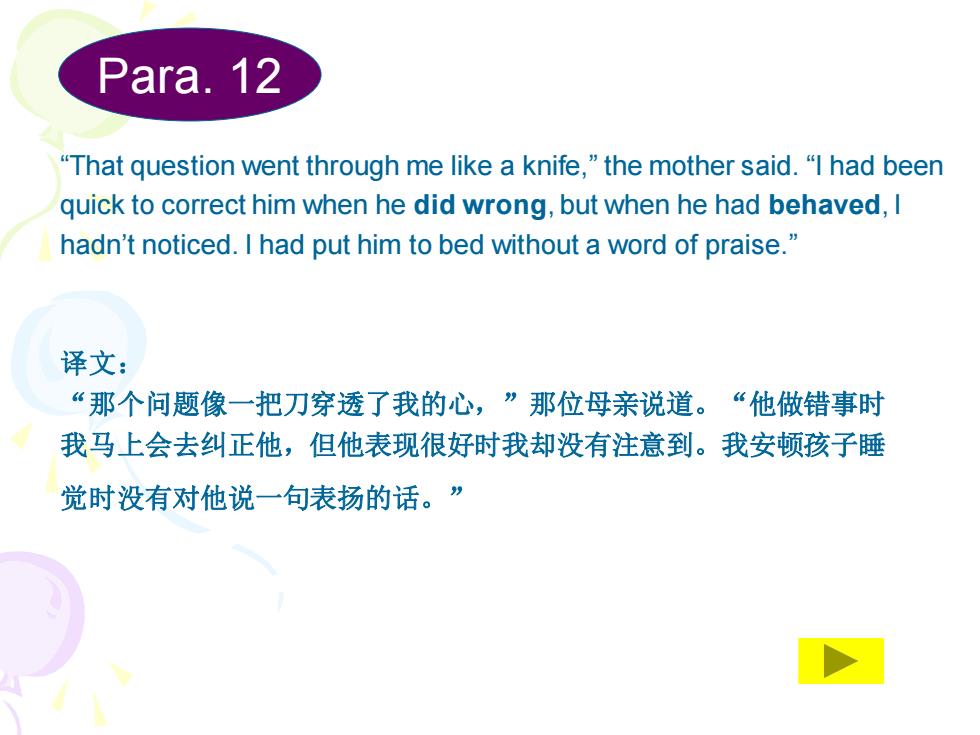
Para.12 "That question went through me like a knife,"the mother said."I had been quick to correct him when he did wrong,but when he had behaved,I hadn't noticed.I had put him to bed without a word of praise. 译文: “那个问题像一把刀穿透了我的心,”那位母亲说道。“他做错事时 我马上会去纠正他,但他表现很好时我却没有注意到。我安顿孩子睡 觉时没有对他说一句表扬的话
“That question went through me like a knife,” the mother said. “I had been quick to correct him when he did wrong, but when he had behaved, I hadn’t noticed. I had put him to bed without a word of praise.” Para. 12 译文: “那个问题像一把刀穿透了我的心,”那位母亲说道。“他做错事时 我马上会去纠正他,但他表现很好时我却没有注意到。我安顿孩子睡 觉时没有对他说一句表扬的话
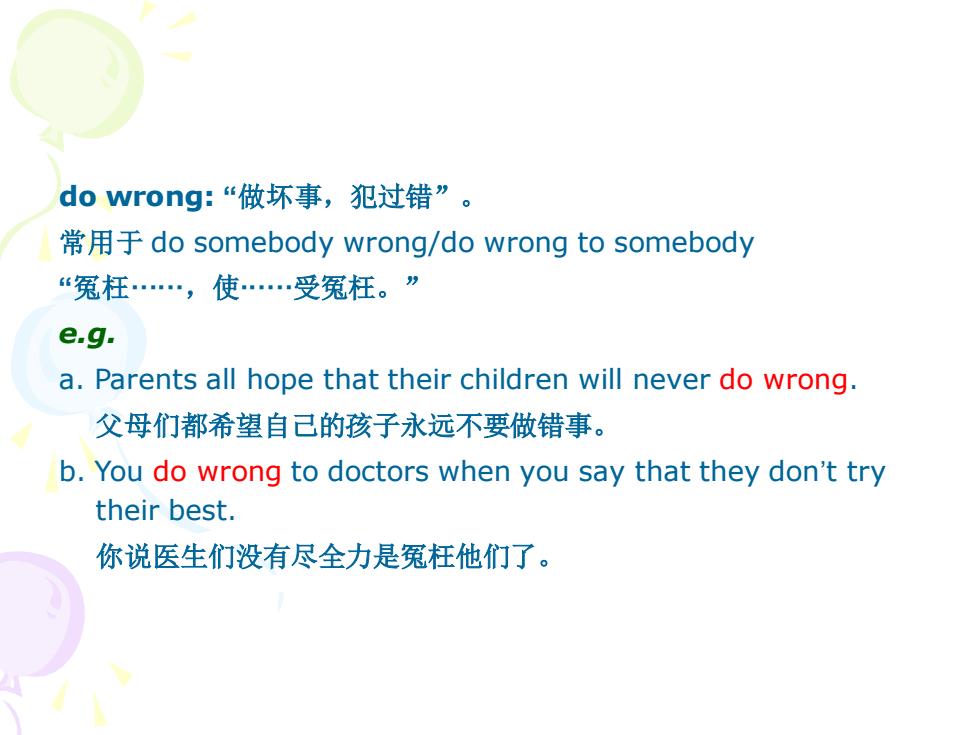
do wrong:“做坏事,犯过错”。 常用于do somebody wrong/do wrong to somebody “冤枉…,使…受冤枉。” e.g. a.Parents all hope that their children will never do wrong. 父母们都希望自己的孩子永远不要做错事。 b.You do wrong to doctors when you say that they don't try their best. 你说医生们没有尽全力是冤枉他们了
do wrong: “做坏事,犯过错” 。 常用于 do somebody wrong/do wrong to somebody “冤枉······,使······受冤枉。” e.g. a. Parents all hope that their children will never do wrong. 父母们都希望自己的孩子永远不要做错事。 b. You do wrong to doctors when you say that they don’t try their best. 你说医生们没有尽全力是冤枉他们了
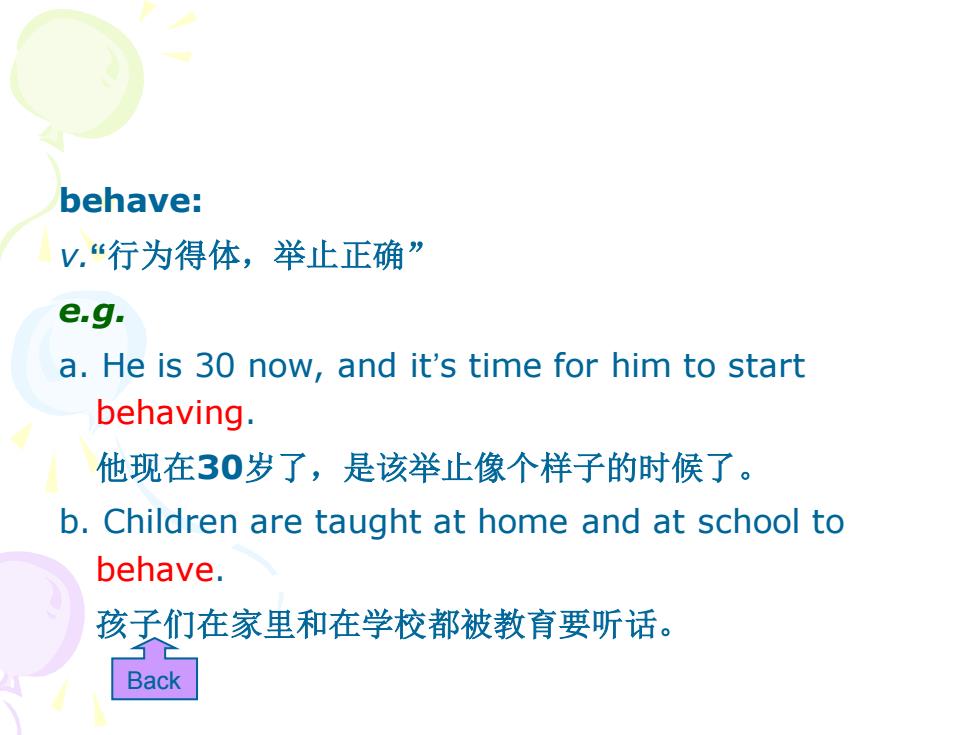
behave: V.“行为得体,举止正确” e.g. a.He is 30 now,and it's time for him to start behaving. 他现在30岁了,是该举止像个样子的时候了。 b.Children are taught at home and at school to behave. 孩子们在家里和在学校都被教育要听话。 Back
behave: v.“行为得体,举止正确” e.g. a. He is 30 now, and it’s time for him to start behaving. 他现在30岁了,是该举止像个样子的时候了。 b. Children are taught at home and at school to behave. 孩子们在家里和在学校都被教育要听话。 Back
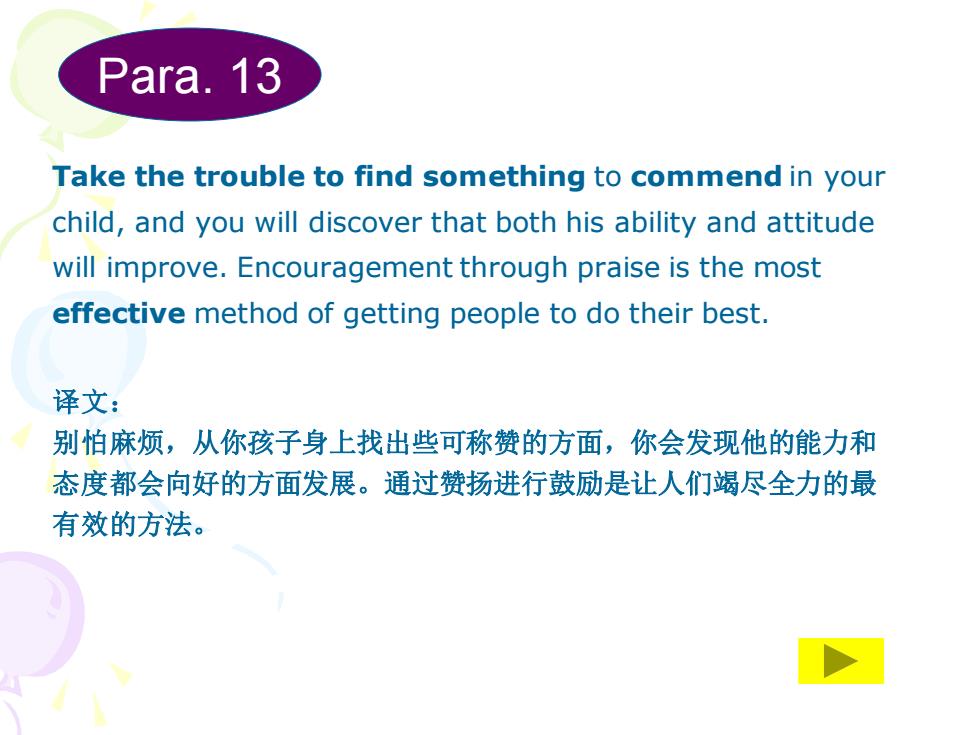
Para.13 Take the trouble to find something to commend in your child,and you will discover that both his ability and attitude will improve.Encouragement through praise is the most effective method of getting people to do their best. 译文: 别怕麻烦,从你孩子身上找出些可称赞的方面,你会发现他的能力和 态度都会向好的方面发展。通过赞扬进行鼓励是让人们竭尽全力的最 有效的方法
Take the trouble to find something to commend in your child, and you will discover that both his ability and attitude will improve. Encouragement through praise is the most effective method of getting people to do their best. Para. 13 译文: 别怕麻烦,从你孩子身上找出些可称赞的方面,你会发现他的能力和 态度都会向好的方面发展。通过赞扬进行鼓励是让人们竭尽全力的最 有效的方法
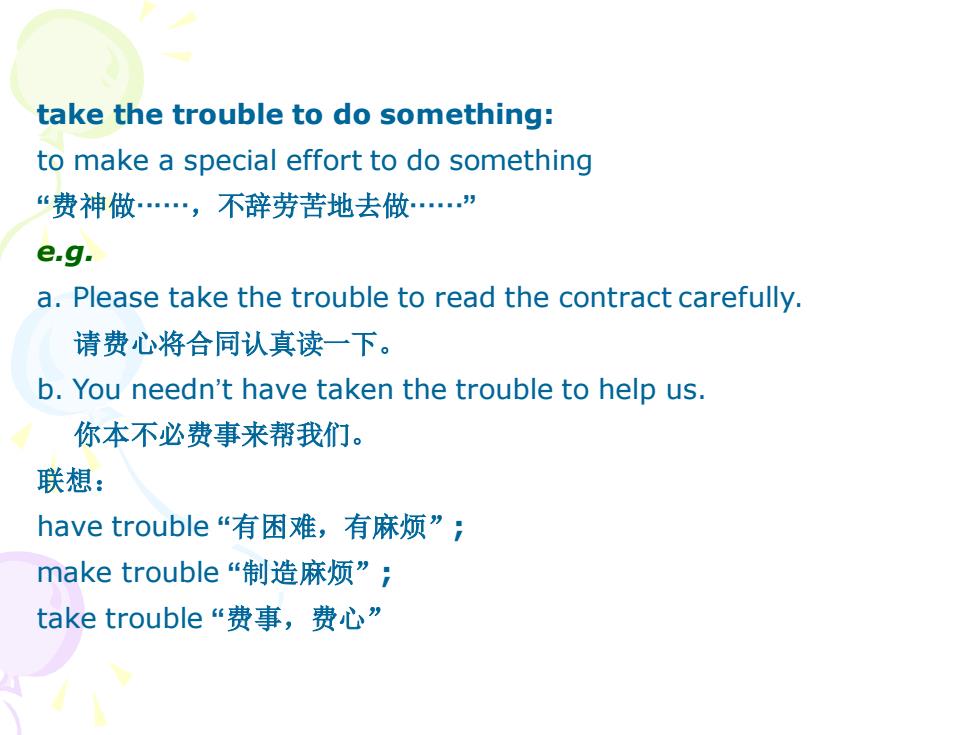
take the trouble to do something: to make a special effort to do something “费神做…,不辞劳苦地去做…” e.g. a.Please take the trouble to read the contract carefully 请费心将合同认真读一下。 b.You needn't have taken the trouble to help us. 你本不必费事来帮我们。 联想: have trouble“有困难,有麻烦”; make trouble“制造麻烦”; take trouble“费事,费心
take the trouble to do something: to make a special effort to do something “费神做······,不辞劳苦地去做······” e.g. a. Please take the trouble to read the contract carefully. 请费心将合同认真读一下。 b. You needn’t have taken the trouble to help us. 你本不必费事来帮我们。 联想: have trouble “有困难,有麻烦”; make trouble “制造麻烦”; take trouble “费事,费心
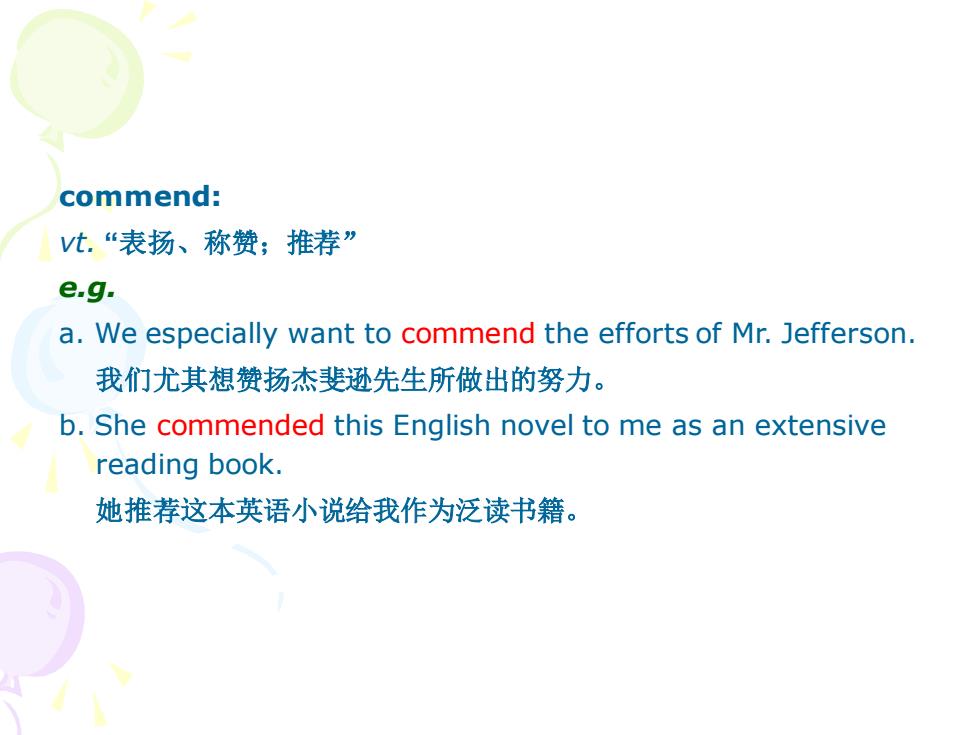
commend: Vt.“表扬、称赞,推荐” e.g. a.We especially want to commend the efforts of Mr.Jefferson. 我们尤其想赞扬杰斐逊先生所做出的努力。 b.She commended this English novel to me as an extensive reading book. 她推荐这本英语小说给我作为泛读书籍
commend: vt. “表扬、称赞;推荐” e.g. a. We especially want to commend the efforts of Mr. Jefferson. 我们尤其想赞扬杰斐逊先生所做出的努力。 b. She commended this English novel to me as an extensive reading book. 她推荐这本英语小说给我作为泛读书籍
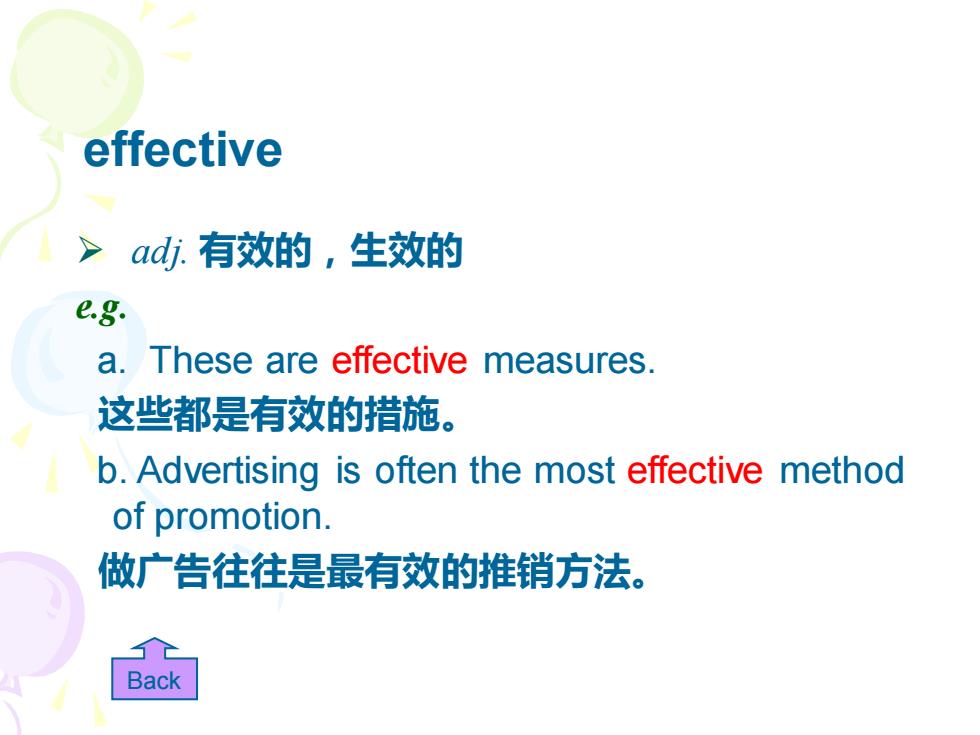
effective >ad.有效的,生效的 e.g. a.These are effective measures. 这些都是有效的措施。 b.Advertising is often the most effective method of promotion 做广告往往是最有效的推销方法。 Back
➢ adj. 有效的,生效的 e.g. a. These are effective measures. 这些都是有效的措施。 b. Advertising is often the most effective method of promotion. 做广告往往是最有效的推销方法。 effective Back